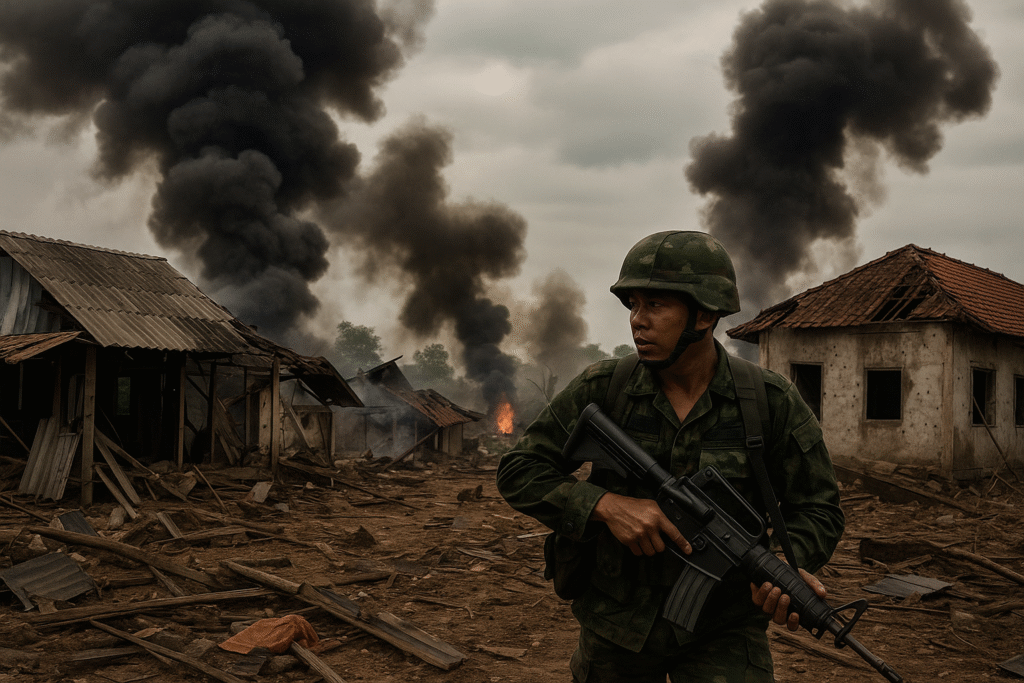
Thailand has warned that border clashes with Cambodia can turn into full-scale war, with heavy weapons being used and battles erupting in at least 12 places. Acting Prime Minister Phumtham Wechayachai confirmed at least 16 people have already been killed in violent clashes and tens of thousands of people displaced on both sides.
Thailand’s government accused Cambodia of indiscriminate shelling of residential areas, which led to emergency evacuations of villages in the vicinity. Cambodia in turn retaliated with serious allegations that Thailand has used internationally prohibited cluster bombs—an allegation Thailand thus far has not responded to.
No Space for Third-Party Intermediation
Against increasing international pressure, Thailand insists the conflict between the two nations is to be resolved bilaterally. Foreign Minister Nikorndej Balankura rebuffed foreign interference, stating, “We don’t need third-party mediation yet. Phnom Penh must cease its aggression.” This comes after Malaysia, as the chair of ASEAN at the moment, offered to serve as mediator. Malaysian Prime Minister Anwar Ibrahim was still optimistic on social media, citing “positive signals” between the two nations.
Mounting Death Toll and Despair of Civilians
Thailand suffered 15 fatalities—14 civilians and a soldier—and Cambodian authorities reported a civilian death in Oddar Meanchey province. The loss in human life keeps increasing as intense shelling continues to sweep into border towns. Thai evacuees—children and the elderly—find shelter in emergency camps in Surin province after Thursday’s deadly assaults.
Joi Phasuwan, a grandmother from Phanom Dong Rak, recounted her terrifying ordeal: “We waited a long time before being relocated. This time, we had to travel farther than ever before.” Witnesses reported heavy artillery and rocket barrages, with some reporting it was worse than anything seen during the Cambodian Civil War of the 1980s.
International Appeals for Peace
The war has attracted emergency calls from the U.S., China, France, the EU, and Australia. The U.S. State Department spokesman, Tommy Pigott, demanded “immediate cessation of hostilities” and stressed safety for civilians. China, in close association with both countries, appealed for peaceful talks, similar to Western governments.
The United Nations Security Council will meet to discuss the deteriorating situation. In a Thursday letter of filing, Cambodian Prime Minister Hun Manet called on the Council to act to “halt Thailand’s aggression.”
Competing Claims about What Triggered the Violence
Both sides have continued accusing one another of launching an attack. Thailand accuses Cambodia of fanning violence by sending spy drones over the Thai soldiers. Cambodia, however, accuses Thai soldiers of breaching an accord by moving toward an ancient Khmer-Hindu temple.
The conflict on the border has rested on colonial-era differences dating back over over a century, primarily over ancient religious shrines. While the fighting has happened previously, the current level of military escalation is the most severe in over a decade.
Tensions Ignite Old Rivalries
Hostilities broke out anew in May after a Cambodian soldier was killed in a border skirmish, greatly worsening diplomatic relations. Tensions have flared at intervals since then, with each side blaming the other and deploying troops toward disputed territories.
For others in the affected regions, life has become uncertain. Those who reside along the borderline are in the midst of crossfire, their homes abandoned, and the future uncertain. The stability of Southeast Asia’s region is now at stake as the threat of wider conflict approaches.
Conclusion
While war fears mount, the globe holds its breath, calling for restraint and peace. Thai and Cambodian people can only hope for peace to come as quickly as possible. The next few days will be critical to decide if diplomacy wins—or war is the option.